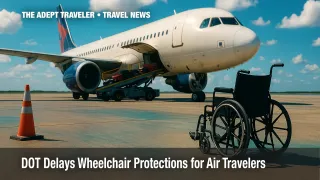DOT Delays Wheelchair Protections for Air Travelers

Flying should never jeopardize a person's mobility or dignity, yet too many wheelchair users still arrive to find their chairs damaged, delayed, or missing. The new protections issued by the U.S. Department of Transportation Headquarters, Washington, DC promise the most significant overhaul of disability rights in air travel since 2008, but a fresh pause on enforcement has raised urgent questions for passengers who rely on mobility devices.
Key Points
- Enforcement delayed until at least Aug. 1.
- Rule defines a "mishandled" wheelchair and mandates 24-hour return.
- Annual, hands-on training required for staff who lift chairs or assist passengers.
- Airlines must fund prompt repairs, replacements, or loaner wheelchairs.
- Cargo-hold dimensions and fare-difference refunds become mandatory.
What the Regulations Actually Require
How the U.S. Department of Transportation Headquarters, Washington, DC Rule Strengthens Existing Protections The 137-page final rule, titled Ensuring Safe Accommodations for Air Travelers with Disabilities Using Wheelchairs, amends 14 CFR Part 382 under the Air Carrier Access Act. It crystal-clears "mishandled" to include any chair returned late or in worse condition-removing previous wiggle room that let carriers escape fines. Airlines must now deliver a delayed wheelchair to the passenger's final destination within 24 hours on domestic and short-haul international flights, or within 30 hours on long-haul trips. Failure triggers automatic compensation and DOT penalties.
Hands-On Training and Dignified Assistance Every frontline employee or contractor who lifts wheelchairs or helps passengers must complete initial hands-on instruction-involving mannequins or demo equipment-and pass an annual competency assessment. Carriers must consult disability-advocacy groups when updating curricula, embedding lived experience directly into training. "Prompt" assistance is codified: aisle-chair personnel and equipment must be ready as soon as general boarding starts, and deplaning help must arrive no later than the moment the last aisle-seat passenger exits.
Real-World Relief for Damaged Chairs If an airline breaks a chair, the traveler-not the carrier-chooses repair or full-value replacement, including custom components. During repairs, airlines must provide a loaner wheelchair tailored "to the maximum extent possible"-for example, swapping cushions or repositioning joysticks before the passenger leaves the airport. Should the loaner fall short, flyers may rent an alternative and submit receipts for reimbursement within 30 days.
Pricing Transparency and Fare Equity
Starting early next year, carriers must publish exact cargo-door heights and widths for every aircraft on their websites. If a flyer discovers their chair won't fit after booking, the airline must move them to a larger-hold flight and refund any fare difference. An expanded rollout of safer on-board wheelchairs and electronic notifications-letting passengers know when their device is loaded or unloaded-kicks in by December 17, 2025.
Timeline for U.S. Department of Transportation Headquarters, Washington, DC Compliance
- Jan. 16, 2025 - Rule officially takes effect (initial provisions).
- Jun. 17, 2025 - Training standards and data-reporting deadlines arrive.
- Dec. 17, 2025 - Real-time load notifications and upgraded on-board chairs.
- Aug. 1, 2025 (or later) - Current administration's enforcement start-date after legal review.
Analysis
For the 5.5 million Americans who depend on wheelchairs, air travel remains a high-stakes gamble; DOT data show roughly one in 100 mobility devices is mishandled. The new rule tackles that statistic head-on with bright-line timelines, concrete dollar remedies, and the novel loaner-chair mandate. By requiring hands-on drills rather than slide-deck tutorials, regulators acknowledge that safe transfers hinge on muscle memory, not policy binders.
Yet every month of delayed enforcement leaves passengers vulnerable. Without penalties, airlines retain little incentive to re-engineer baggage rooms or schedule extra ramp agents-capital-intensive changes the rule explicitly demands. The pending lawsuit from Airlines for America argues that rapid-return and customization requirements are "operationally impractical," but disability advocates counter that mobility is a civil right, not an add-on amenity. The compromise may come down to phased grace periods, though the core standards are unlikely to disappear.
Travel advisors should proactively verify cargo-hold specs, flag tight connections where prompt assistance could fail, and budget contingency time for chair inspections upon arrival. Encourage clients to photograph their device at check-in, store control-panel settings on a phone, and carry a lightweight repair kit. Until enforcement begins in earnest, self-advocacy remains the first line of defense.
Final Thoughts
The delayed rollout of the wheelchair-protection rule is frustrating, but travelers should view it as a pause-not a retreat. Comprehensive, enforceable safeguards are finally on the books, and once they take hold they promise a sea change for accessible travel. For anyone who has hesitated to fly, the imminent protections from the U.S. Department of Transportation Headquarters, Washington, DC signal that safer skies are within reach. Until then, vigilance, documentation, and a trusted travel advisor can bridge the gap.
